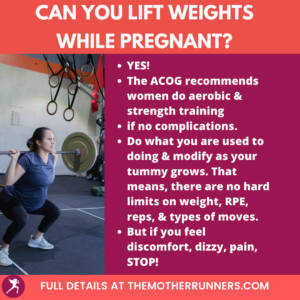(Reviewed by Dr. Carrie Pagliano, DPT) Pregnant women with uncomplicated pregnancies can continue to lift weights. Most pregnant women will need to make modifications to do so. Lifting weights has many health benefits for the mother if they are able to continue this healthy habit.
Much has changed in recent years around what pregnant woman can and can’t do. Some societies are more progressed than others, but many are embracing that woman can do
more than yoga and walk during pregnancy. Pregnant women can run. And yes, women can lift weights while pregnant.

In fact, in 2002 the American College of Obstetricians and Gynecologists (ACOG) stripped limitations on pregnancy and exercise. Instead, it recommended pregnant women exercise for at least 30 minutes a day, noting “women with uncomplicated pregnancies should be encouraged to engage in aerobic and strength-conditioning exercises before, during, and after pregnancy.”
Our bodies are amazing and will communicate clearly that it shouldn’t be doing something. This goes for running…and strength training during pregnancy.
Related: A Complete Guide to Running During Pregnancy
How I train my pregnant athletes
With the athletes I coach, I communicate constantly about our lifting and running program and scale it to what the pregnant athlete feels comfortable doing. Over time, we do things like run by time and effort versus distance and pace. And we modify strength training exercises with lower weight or reps based on feel.

While we’ve come a long way in our knowledge around what’s safe for running during pregnancy, there is reason to be unsure as there isn’t much information shared about lifting weights during pregnancy.
This is where I come in. I connected with Dr. Carrie Pagliano, a doctor of physical therapy specializing in pelvic health (and also a mother runner who lifts heavy weights), to clearly outline what you can and cannot do when strength training while pregnant.
(Reminder: I am a running coach, not a doctor. Talk to yours if you have health concerns.)
In this article, I will cover:
Table of contents
- Can pregnant women lift weights?
- What are the benefits of lifting weights during pregnancy?
- Commonly Asked Questions About Lifting Weights During Pregnancy:
- Are there limitations on pregnant women lifting weights?
- Can you lift weights over your head during pregnancy?
- Can you squat with weights when pregnant?
- Can you do exercises on your back during pregnancy?
- Is weight lifting safe during all three trimesters?
- Modifications for lifting weights while pregnant, according to Pagliano, include:
- Do’s and Don’ts of Lifting Weights While Pregnant
- Best Strength Training Moves for Pregnant Women
- Pro Tips for Lifting Weights During Pregnancy
Let’s get going, shall we?
Can pregnant women lift weights?
Yes, pregnant women can lift weights if they don’t have risk factors that prevent them from doing so. Pregnant women can even lift heavy weights.
According to ACOG, “women with uncomplicated pregnancies should be encouraged to engage in aerobic and strength-conditioning exercises before, during, and after pregnancy.”

However, what pregnant women can and can’t do in the gym isn’t specified because it’s all relative. Essentially, pregnant women can do what they are used to doing and scale it so it feels comfortable (as long as they don’t have pregnancy complications such as placenta previa or high blood pressure, for example).
There are no specific guidelines for what you can and can’t do as far as lifting weights during pregnancy. E.g. there isn’t a limit on amount of weight, sets, reps, or even effort.
“We’re still working on establishing updated norms since most of the research historically points to light weights, gentle walking, etc..,” says Dr. Pagliano.
Related: Complete Strength Training for Runners Guide
What the research says:
A recent study in the International Urogynecology Journal surveyed almost 700 pregnant women who lifted weights during pregnancy (think Crossfit and Olympic Style lifting). Most of the women had no complications during pregnancy or delivery. Also, these women “reported significantly less reproductive complications than those who ceased training levels prior to delivery,” read the study.
The study concluded that women who engaged in “heavy prenatal resistance training had typical perinatal and pelvic floor health outcomes that were not altered whether they engaged in, or avoided Olympic lifting, Valsalva or supine weightlifting.”
Related: How to Strength Train for the Marathon
What are the benefits of lifting weights during pregnancy?
Specifically, according to a meta-analysis in the Journal of Strength and Conditioning, the benefits of lifting weights during pregnancy may include:
- Protection against low back pain and pelvic pain
- Help with baby’s development related to attentiveness
- Shorten labor and risk for preterm delivery or preterm labor
- Better weight management
- Lower risk of gestational diabetes
- Lower risk of preeclampsia
- Improved body image, and
- Better mood
Related: Baby Benefits of Running While Pregnant
If you are able to lift weights during pregnancy, it may help you:
- Stay strong and stable as your body changes and grows
- Help through the postpartum process
- And prepare for delivery
In general, exercise by pregnant women is good for:
- All types of basic physical health for both mother and baby
- Helps prevent relevant pregnancy-related disorders, such as gestational diabetes, excessive gestational weight gain, hypertensive disorders, urinary incontinence, fetal macrosomia, lumbopelvic pain, anxiety and prenatal depression, and
- Decrease lower back pain and pelvic pain, according to the Journal of Sports Medicine.
Related: 16+ Arm Workouts for Runners
Commonly Asked Questions About Lifting Weights During Pregnancy:
Ok, so let’s get to the nitty gritty of commonly asked questions about lifting weights during pregnancy.
Are there limitations on pregnant women lifting weights?

There are no formal limitations for pregnant women and resistance training. For example, there is no limit to how much you can lift, for how long, your effort, breath rate, or heart rate.
Everyone has different experience levels and experiences when it comes to resistance exercises and pregnancy, so there is no one size-fits-all guide.
Related: Can You Run a Marathon While Pregnant?
If I were to write one, it would be this:
- Don’t try anything new during pregnancy. It’s not a good idea to pick up Crossfit for the first time while pregnant, for example. If you do, be sure you work with a fitness trainer who is experienced helping pregnant women to guide you. And be sure you talk to your doctor before you do.
- Let your body be your guide. Do what feels comfortable. If you feel unsure or something doesn’t feel right, OR if something is hurting, don’t do it! It’s not worth the risk.
-
Always, check with your doctor. Talk to your ob-gyn or midwife about your exercise program. Be sure to let your provider know your prior pre-pregnancy activity level so you can collaboratively make the best decision for you as an individual.
Related: Should I See a Pelvic Floor Specialist?
Can you lift weights over your head during pregnancy?
Yes, you can lift heavy weights overhead during pregnancy but it’s usually “harder to retain tension in the belly with overhead weights so you will typically have to lighten up,” says Dr. Pagliano.
Therefore, if it’s hard to maintain proper form, balance, and posture, it’s too heavy. If it’s comfortable and feels normal, then you’re good.
Can you squat with weights when pregnant?
Yes, you can squat with weights during pregnancy as long as it’s comfortable and you don’t feel pelvic pressure or pain. As Dr. Pagliano says, “You have to squat to sit on a toilet and it’s a common birthing position (it’s good to open the hips), so it’s all good to squat!”
Can you do exercises on your back during pregnancy?
You can lie on your back to do exercises during pregnancy, but you may have the desire to change positions. There is a major vein in your back called the vena cava, which supplies blood flow to your baby, so it may make you feel dizzy. Your body will tell you what’s comfortable and safe, notes Dr. Pagliano.
Related: The Best Pregnancy Core Workout (+ Video Demo)
Is weight lifting safe during all three trimesters?
You can lift weights during all three trimesters of pregnancy, though not everyone can or should. Every pregnancy is different. What’s safe and comfortable during one pregnancy may not feel safe and comfortable for another.
Related: Why Do My Hips Hurt Running Postpartum?
If you experience the following, then you need to stop doing what you’re doing and modify:
- Leakage
- Pressure
- Pain or discomfort
- Coning and doming of the abdomen
- Dizziness
- Instability
- Discomfort during exercise
Related: Postpartum Running Plan
Modifications for lifting weights while pregnant, according to Pagliano, include:

- Instead of laying flat on your back, you do your exercises in a reclined position, use a soft ball behind the small of your back for support.
- Exercises that involve lying flat on your stomach like the Superman exercise, can be done seated in a chair.
- Lighter weights or resistance bands can be used.
- Resistance machines may offer more stability than free weights.
- As your bodyweight increases, this means bodyweight exercises will become more challenging—making them a good substitute for weights.
- Push-ups can be done on the wall.
- Use a belly band like Recore Fitness Fit Splint for added support of your growing belly.
- Do less reps or sets of lifting.
- Focus on holds in lieu or heavier weights or higher reps.
Related: The Best Belly Bands for Pregnant Runners
Considerations of Lifting Weights During Pregnancy
Remember that during pregnancy, your body is undergoing changes. Therefore, it’s important to take into consideration that:
- Your body’s center of gravity will be different, so it may feel tougher to balance.
- You will also be getting heavier, so bodyweight exercises will feel harder.
- The hormone relaxin will be loosening your ligaments, tendons and joints, possibly putting you at a higher risk of injury.
- Your heart rate is higher, so you may feel out of breath easier.
Do’s and Don’ts of Lifting Weights While Pregnant
So, if it’s okay to lift weights during pregnancy, what is safe and unsafe when it comes to strength training while pregnant? Dr. Pagliano clarifies what are the do’s and don’t’s of lifting weights during pregnancy.
Do’s of lifting during pregnancy
DO:
- Keep doing what you’re doing (unless your doctor says otherwise).
- Talk to your doctor about your current activity levels and use Rate of Perceived Exertion (RPE) as a good sense of your heart rate and respiratory rate. For most pregnancy women, using the “Talk Test” to gauge your effort level is a great way to ensure you’re in the safe zone.
Related: 4 Best Sports Bras for Runners with Big Busts
Don’t’s of lifting during pregnancy
DON’T:
- Feel like you HAVE TO despite nausea, fatigue, pelvic pain, etc.

Related: Tight Pelvic Floor Muscles: Symptoms and Solutions
Best Strength Training Moves for Pregnant Women
So, what are the best strength training exercises for pregnant women? “Anything that makes you feel good!” says Dr. Pagliano.
That means whatever you enjoyed doing before you, you can keep doing with modifications throughout your pregnancy.
Here are weight training exercises to AVOID during pregnancy, or modify:

- Cleans
- Snatches
- Box jumps
- Rope climbs
- Plyometrics
- Supermans on your stomach
Related: The Best Belly Bands for Pregnant Runners
Pro Tips for Lifting Weights During Pregnancy
- Check with your doctor. Be sure to talk to your ob-gyn or midwife about your exercise program and get the green light.
- Incorporate mobility and pelvic floor relaxation. The pelvic floor has to relax so the uterus can contract and work with the baby for delivery.
- You can relax the pelvic floor with moves such as child pose, happy baby, and reclined butterfly.
- Check out my 5-minute mobility routine for runners.
- It’s always a good idea to work with a pelvic floor physical therapist during pregnancy and postpartum. I wish I had a long time ago!
- Know what your exercise bias is and fill in the blank. If you only run, it might be time to add some prenatal yoga or pilates for a well-balanced workout. Remember that your movement needs and abilities may change throughout your pregnancy based on symptoms, fetal status, fatigue, and other issues that are beyond your control. I discovered that I loved barre during my second pregnancy, for example.
- Avoid the waddle. Take shorter steps to avoid less asymmetry, less pelvic girdle and pubic bone pain.
- Remember to bend at the knees. Keep your tummy muscles held in and your back straight when you are lifting anything.
- Use your breath. Reduce breath holding and use slow controlled exhalation before AND during effort to activate core (it’s changing zip codes as you get bigger) and pelvic floor.

I hope this lifting for pregnancy guide set you up for success for a healthy pregnancy and beyond!
If you want guidance with your pregnancy or postpartum fitness goals, check out my run coaching services. Also, be sure to check out my free training plans:
- Postpartum Training Plan
- After a Break Training Plan
- 5k Training Plans
- 10k Training Plans
- Half Marathon Training Plans
- Marathon Training Plans
- Strength Training Plan
